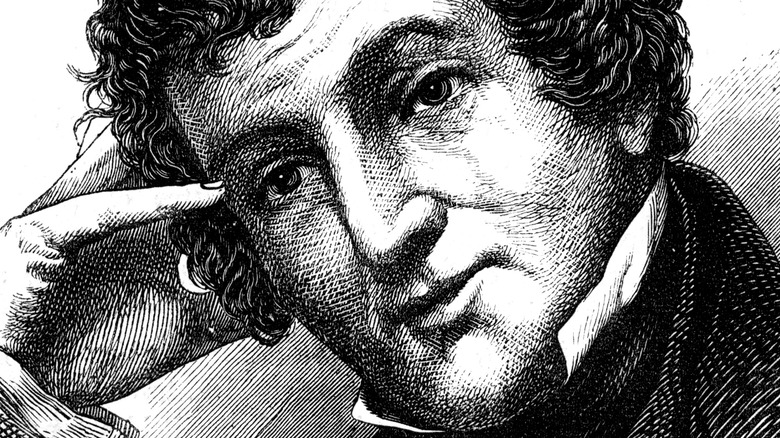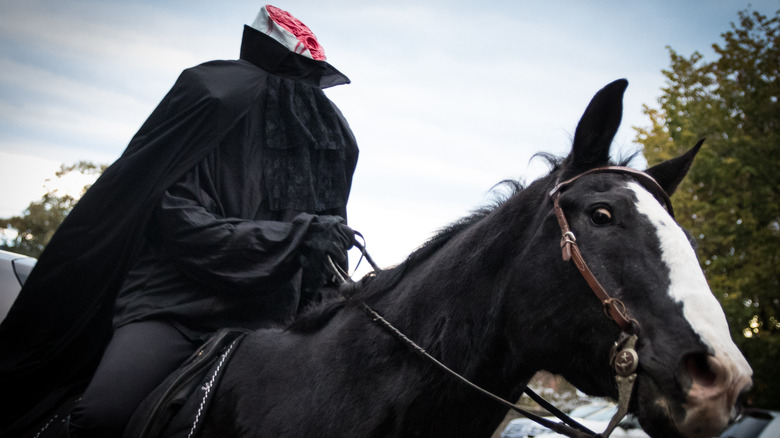The Legendary Last Words Of Washington Irving
Eighteenth and early 19th century author Washington Irving was known as one of America's first men of letters, perhaps most famous for his short story, "The Legend of Sleepy Hollow" (via Britannica). Irving gave Americans their first dose of the Headless Horseman tale, an adaptation of a German legend. Irving came up with the idea for the chilling tale of a Hessian-like soldier while in his native England, as he discussed German folktales with his friend and fellow writer Walter Scott (via FolkloreThursday). Scott and Irving shared a fondness for tales of "geists," ghosts that could occasionally be spotted on horseback. Irving was particularly fond of the Grimms' story of "Hans Jagenteufel," set in 1644, with a cursed headless horseman. When he returned to Tarrytown, New York, Irving adapted the tale but cast the eerie pallor of Germanic folklore upon it, albeit with dreary characters such as schoolmaster Ichabod Crane and his love interest, the Dutch immigrant Katrina von Tassel.
The tale was so influential and legendary that Tarrytown, which Irving speculated was named after the necessity of Dutch settling housewives who "tarried" until their husbands returned home from their respective jobs, renamed itself. Tarrytown, a mostly industrial town in the earliest 20th century, became Sleepy Hollow in 1996 to increase tourism to the town when its local car manufacturer left and 4,000 jobs were lost (via Insider). It appears the author gave the ailing town a new lease on life long after he had passed away.
The man behind the legend
Born in 1783, Washington Irving was named after an early American hero: George Washington (via Historic Hudson Valley). The youngest of 11 children, Irving was only one of eight who survived until adulthood. He put his writing skills to use as an early American journalist, covering the alleged treason of Aaron Burr. During this time, he coined the term "Gotham City" as a moniker for New York, an hour or so south from his Sunnyside abode in the Hudson River Valley. In Irving's day, a Knickerbocker — one of Irving's affectionate terms for New York City-dwelling folk — would have had to travel a couple of days by horseback or carriage to reach that neck of the woods, so to speak.
Irving had an ear for onomatopoeia and deemed Manhattanites "knickerbockers" for their baggy pants of the period and Dutch ancestry (via Online Etymology Dictionary). Irving sought to keep an arm's length from said knickerbockers and decided in 1835, after having extensively traveled Europe, to purchase his Hudson River-side home, Sunnyside, in 1835 for $1,800. Sunnyside was within earshot of all the places Irving immortalized in his Sleepy Hollow adaption — the old Dutch Church where much high drama takes place, and the bridge crossing the Pocanitano River, better known as The Headless Horseman Bridge, are all within walking distance of the writer's home. Today, the city capitalizes on his legend and invites the public to visit where Irving lived, wrote, and died.
Words worth a lot from a famous wordsmith
Not many can say that they have rivaled the famous last words of Oscar Fingal O'Flahertie Wills Wilde, who would become immortalized for his wit. Wilde famously (or infamously, depending on who you asked) died in disgrace in Paris, France, exiled from his native England and Ireland for his love affair with a member of the English aristocracy, Lord Alfred Douglas. Wilde is said to have murmured before death, "My wallpaper and I are fighting a duel to the death. One or the other of us must go" (via The Atlantic).
Irving died of a heart attack, according to MysticBooks.org. At age 76, he had finished a final volume of a biography of his namesake, George Washington. According to a legend of the Hudson River Valley folk, Irving's last words were, "Well, I must arrange my pillows for another night. When will this end?" Those interested today can visit his final resting place in the Sleepy Hollow Cemetery where he was interred beneath a simple headstone December 1, 1859. Irving's death was memorialized by another American wordsmith, Henry Wadsworth Longfellow, in 1876, in his poem "In The Churchyard at Tarrytown." The poem both laments and celebrates the iconic man of early American literature in its conclusion, exclaiming (via MysticBooks.org):
"How sweet a life was his; how sweet a death! / Living, to wing with mirth the weary hours, / Or with romantic tales the heart to cheer; / Dying, to leave a memory like the breath / Of summers full of sunshine and of showers, / A grief and gladness in the atmosphere."


